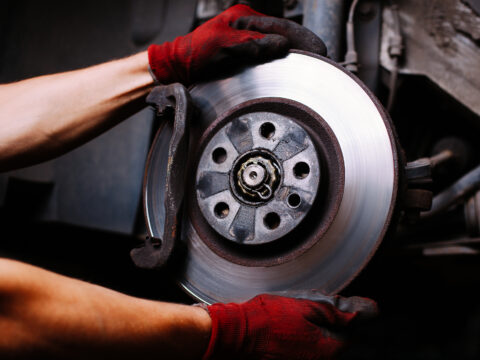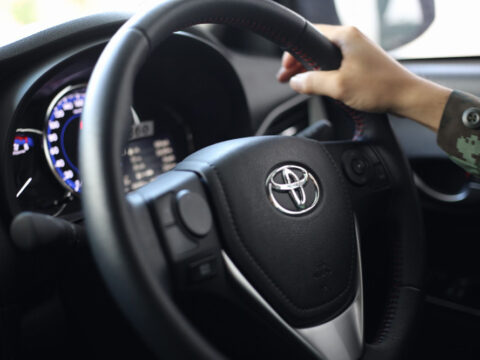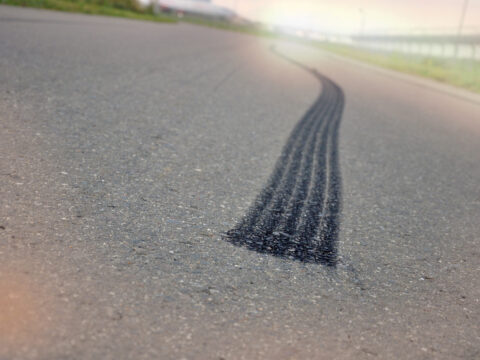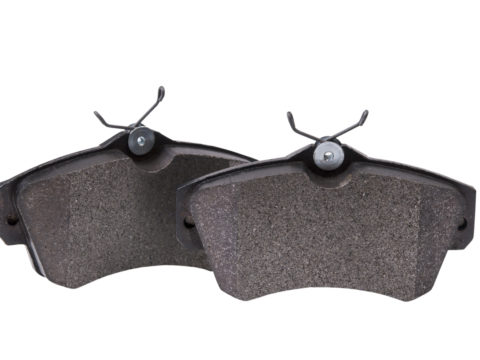Losing pressure in your braking system is something that can happen to any vehicle, no matter how well maintained. In some cases, it can be sudden. In others, it can happen over time.
Regardless, losing brake pressure is an issue that you must address immediately. Here is how.
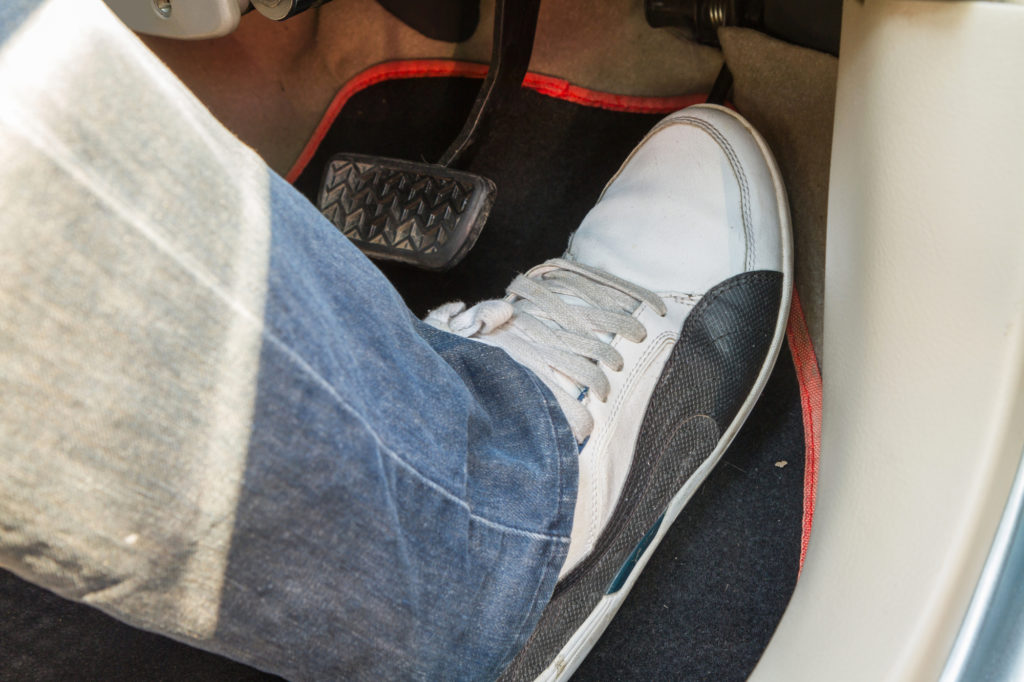
Contents
Brake System Overview
Your vehicle’s braking system is a complex combination of controlled energy, pressure, and friction. It functions on the concept of converting kinetic energy to thermal energy.
That is a fancy way of saying your brakes stop your vehicle’s movement by transferring your speed into heat via friction from the application of your brake pads.
When you press your brake pedal, thousands of pounds of pressure get applied on the four brakes (two in the front, two in the rear.) That pressure depresses brake pads onto the rotors of your wheel and slows your momentum.
What Does It Mean When the Brake Pedal Goes to the Floor?
When you depress the brake pedal, pressure in the brake line provides some resistance to your action.
Typically, your vehicle stops before the brake pedal hits the floor. When there is an issue in your braking system, that pressure ceases to exist, and you can press the brake pedal to the floor.
That also means your vehicle stops much more slowly. In the worst-case scenario, your car cannot stop in time to avoid a collision, or your brakes fail entirely.
What Makes the Brake Pedal Go to the Floor
When your brake system is deprived of pressure internally, there is no resistance to your braking. That lack of pressurization requires you to press harder and further on the brake pedal to get your vehicle to stop.
Several issues can cause this to happen.
1) Brake Line Leak
The brake fluid in your brake lines provides the pressurized system necessary to apply your brake pads. If your braking system lacks brake fluid, the pressurization disappears. The result is your brake pedal will extend to the floor to stop your vehicle.
If you have a leak in your brake line, brake fluid can escape, causing the braking system to lose pressurization.
2) Malfunctioning Master Cylinder
The master cylinder in your vehicle helps manage the application of brake fluid pressure to slow your vehicle and stop it from moving. The pressure gets reduced, potentially dramatically, if your master cylinder is malfunctioning or is not working at all.
In this case, the brake pedal will go to the floor, and the vehicle will stop very slowly. If the master cylinder is broken, your brakes may not work at all. The most likely issue with the master cylinder is a problem with the seals that hold the brake fluid in.
3) Air in the Brake Line
Air can cause a pressure decrease when there is air in the brake lines from improper bleeding after changing the master cylinder. It also can happen if you change your brakes yourself and do not bleed the line out correctly.
What happens is that air in the line blocks the brake fluid flow, which prevents the appropriate pressure from being applied. The result is a “spongy” feeling when you depress the brake pedal. Bleeding the line properly is key to avoiding damage to the brake line.
4) Malfunctioning Brake Booster
The brake booster in your vehicle helps deliver the braking power you need to stop your car. If there is an issue with the brake booster, the pressure could be lacking, and your pedal will depress to the floorboard.
Brake boosters are located between the brake pedal and the master cylinder; eventually, that connection extends to the engine.
It has a vacuum line that helps overcome any fluid pressure from the braking system. If that is punctured or failing, your vehicle will stop more slowly. In this case, the good news is that your vehicle will stop, but it will take a lot of work on your part.
5) Driving Style
Driving style can also affect how far you have to depress the brake pedal to stop your vehicle. There are two principal ways:
Riding Your Brakes
If you are hard on your vehicle’s brakes, your brake fluid increases in temperature, which affects its density. If the fluid gets hot enough, your brake fluid will thin significantly. The thinner the brake fluid is, the less efficient it becomes at building pressure to stop your vehicle.
The less efficient your brake fluid is at building pressure, the more you have to depress your brake pedal to stop the vehicle.
A chief culprit of this type of pressure issue is riding your brakes. That is usually a result of driving too fast for the road conditions or over-driving on an unfamiliar road.
Unreleased Parking Brake
A second major brake pressure issue related to your driving style is the parking brake. If you left the parking brake engaged and drove around on it, several problems could arise, resulting in your brake pedal feeling spongy.
Driving with an unreleased parking brake wears down your brake pads, increases the temperature of the brake fluid, and wears out the linings of the main brakes.
All of that, left unchecked, can cause you to have to push the brake pedal to the floor to get your brakes to work.
6) Lack of Brake Fluid
If your brake fluid is running low, either because of a leak or natural attrition, you can see a decrease in braking system pressure. If the fluid remains low, it can result in your braking ability diminishing or disappearing.
7) Caliper Leak
Just like a leak in your brake line can deplete your system of brake fluid and pressure, a leak in your caliper can do the same thing. When you employ your brakes, pressure from the brake line forces fluid into the caliper.
If the caliper has a loose seal or is damaged, pressure across the entire braking system will decrease and cause you to press the brake pedal to the floor to be effective.
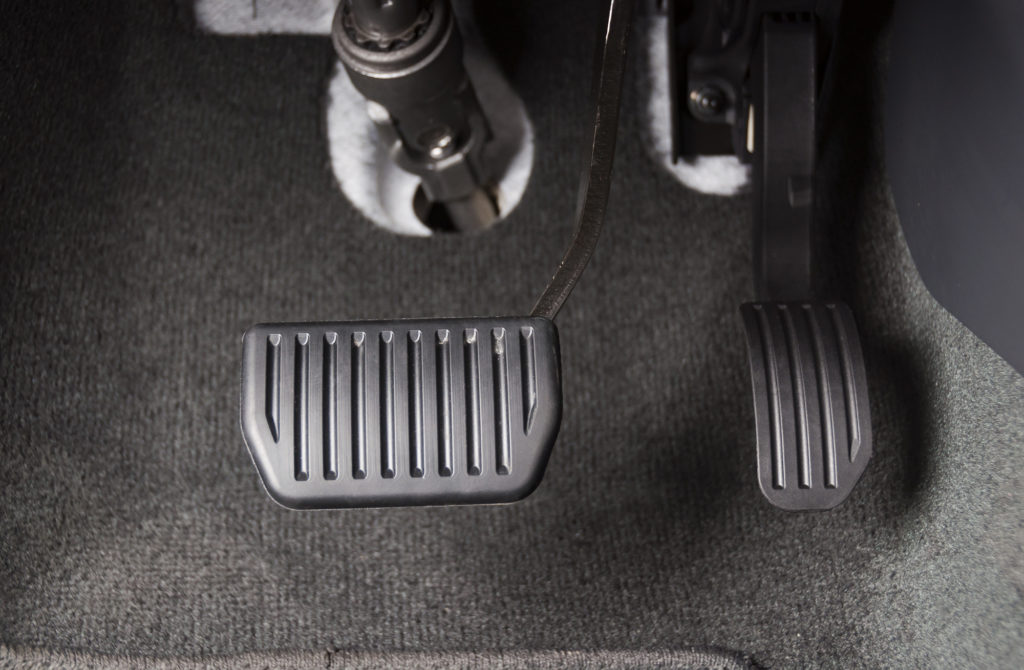
How Do You Diagnose and Fix the Brake Pedal Going to the Floor Problem?
There are several steps to addressing the issue of your brake pedal going all the way to the floor when you press it.
Here is what you will need and what you should do to fix your braking problem.
Tools and Equipment Needed
You will need:
- A flashlight (one that hangs is better)
- Brake fluid
Call a Mechanic
Unless you know what you are doing, messing around with your brakes, apart from refilling the oil reservoir, is not a good idea. It might cost money to have a mechanic work on your brakes but think of the costs if you have an accident because of failing brakes.
Check Brake Fluid in the Brake Fluid Reservoir
The easiest way to diagnose if you leak anywhere in your braking system is to check the brake fluid level in your brake fluid reservoir. You can find this by referring to the manual that came with your vehicle.
If you do not have a manual, go over every reservoir under your hood and look for the brake fluid indicator on one of the lids or caps.
Check the Brake Line
If you verify you likely have a leak, you should check your brake lines. Look for fluid residue on the ground or in any of the wheels. This will probably require removing the tires.
Once you can see into the wheels, trace any fluid you find back to its source. Verify that the source eventually leads to the brake fluid reservoir.
Check the Brake Calipers
While you are at it, take a look at your brake calipers. See if there is fresh fluid residue on them.
Check the Brake Master Cylinder
A mechanic can only do this. If you have discovered a leak, you should still have the master cylinder checked, but checking this will be a challenge unless you are a mechanic.
Bleed Air Out of the Brake Line
Even a novice can do this if you can follow directions. Trying this before you take the vehicle in for a mechanic to look over can save you money. It also can help you better understand how your braking system works so that you can recognize the early signs of a braking problem.
Is It Ok to Drive a Car With the Brake Pedal Sinking to the Floor?
You should never drive with a brake problem. That “goes all the way to the floorboard” situation can quickly escalate to your brakes failing. If at all possible, if you experience a sudden drop in brake tension, get your vehicle to a mechanic quickly.
If the drop in brake pressure has been happening over time, you still need to assess the situation and take your vehicle to a mechanic. In this case, the condition is critical but not dire. Do not, however, ignore the problem as it will not go away.

